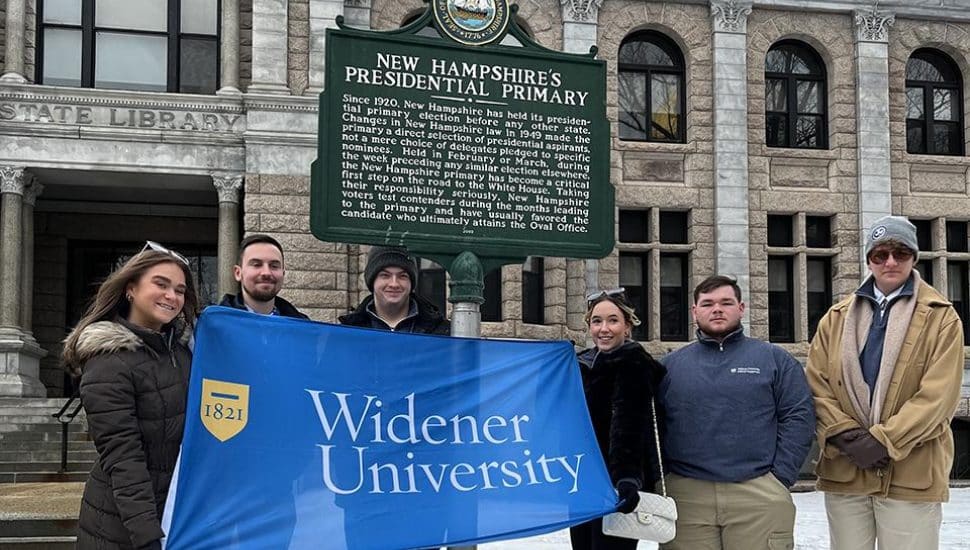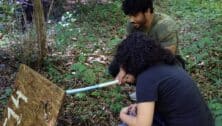Widener Students Get First-Hand Access to New Hampshire Primary

The New Hampshire primary is known for being the first-in-the-nation primary election in presidential election years.
As candidates flocked to the small New England state, so too did a group of Widener students and faculty to get inside access to the events.
Led by Associate Professor Angie Corbo, chair of communication studies, and Professor Wes Leckrone, chair of political science, the group left Widener’s Chester campus and made the drive to New Hampshire.
Over the course of a four-day trip, three communications students, Amanda Rappa ’26, Emyleigh Crean ’27, and Robert Stotsenburg ’27, and three political science students, Kyle Meier ’24, George Hebda ’27, and James Barruzza ’27, documented the sights and sounds.
“New Hampshire is unlike any primary we experience in our region,” said Leckrone. “The stakes for the candidates are high, which attracts a lot of attention from all over the world.”
“I watch the news a lot, and I get to see the news coverage of campaigns, but I was eager to see it for myself,” said Meier. “I’m very thankful for the opportunity. Not a lot of college students or people from our area have the opportunity to travel and experience the primary.”
The group attended events ranging from small, coffee shop speaking engagements to large, nationally broadcasted rallies for candidates such as Democrat Marianne Williamson and Republicans including Nikki Haley and former President Donald Trump.
Their focus is not on the politicians themselves but on the American democratic process at work and the unique energy that New Hampshire holds.
Students spent much of their time interviewing attendees alongside professional media outlets to hear what voters have to say. While the idea of approaching strangers and recording interviews was nerve-wracking at first, the students found that most people were happy to participate.
“There were news outlets everywhere like Fox News, The Washington Post, ABC News, and more. There were also a lot of international news outlets from places like Germany and France, so that was really interesting to see,” said Rappa. “There were a lot of people who were willing to talk to us. Even if their opinions differed from ours, we still wanted to hear what they had to say.”
Back in Pennsylvania, Professor James Vike, associate dean of social science, hosted a watch party and discussion on campus. Students gathered to watch as election results were tallied and broke into discussion groups to share their thoughts on the primary election process in the United States.
There was also a special guest appearance via Zoom live from New Hampshire with Crean and Hebda. The two talked about their experience, answered questions, and gave their predictions for how the primary results would play out before logging off to attend more of the evening’s events.
Corbo and Leckrone first brought students to New Hampshire for the 2020 primary and were glad to be able to bring this unique opportunity to students again this year and reinforce the political science department’s commitment to informed citizenship.
“This trip really helps to connect theory and practice,” said Corbo. “We can discuss candidates and campaigns in the classroom, but being there and meeting candidates face-to-face is an unforgettable experience.”
For Meier, that bridge between theory and practice is already being implemented.
“I’m taking a class right now about parties and elections in America with Dr. Vike, and I feel more confident now in that class because I’ve been on this trip and experienced it firsthand.”
Rappa, who was nervous about her lack of political knowledge before embarking on the trip, learned not only about the political process but also realized the versatility of her communication studies degree as she “captured the chaos.”
“I got there and realized this is a huge part of what I’ve been learning in all of my classes. I realized I can do even more than I thought with my major,” she said.
While New Hampshire won’t have another presidential primary until 2028, the experience and lessons learned will stay with the students for a lifetime.
“I would tell anyone to get involved in the political process and go out and vote no matter what state they’re from,” said Meier. “Something I learned from the smaller candidates is that they’re still determined. They still believe they can make a change, and honestly, we can help them with that by simply going out and voting and staying involved.”
Widener students captured some of their New Hampshire experiences in this TikTok video.
Join Our Community
Never miss a Delaware County story!
"*" indicates required fields
















![95000-1023_ACJ_BannerAd[1]](https://delco.today/wp-content/uploads/sites/3/2023/03/95000-1023_ACJ_BannerAd1.jpg)















